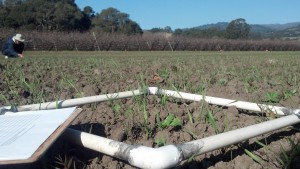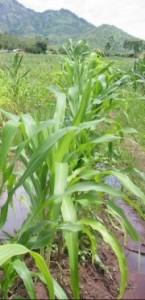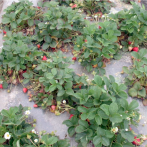Current projects
Cal CORE Network

The California Collaborative Research and Extension (CAL-CORE) Network is a consortium of researchers looking at long-term rotational systems for vegetable and strawberry production on California's central coast. For more information see webpage
Soilborne disease control in strawberry production
We are pioneering the adaptation of a technique called anaerobic soil disinfestation (ASD) as an alternative to soil fumigants for US specialty crop production systems see webpage
Smallholder production systems in Senegal/Gambia (Eldon)
My research interests fall into 2 closely related categories: 1- nutrient cycling in agricultural ecosystems, with the goal of improving nutrient use efficiency, 2- the interaction of environmental and socio-economic factors underlying (or undermining) food security in the rural tropics.
Nutrient management in organic production
Through a series of on-farm trials, we have monitored patterns of plant N uptake and loss to the environment under different management scenarios, developed NPK input/output budgets, and evaluated various soil and tissue tests as tools for improved N management.
Avocado production in Chile (Magdahl)

My research interests are related to conventional intensive agriculture and how to integrate sustainable practices into this system. I am mainly interested in avocado production in Chile, an industry that has grown very strongly in the last 20 years with important changes in management techniques and has developed in to new growing areas. At an industry level I am interested in understanding ways of assessing sustainability and identifying factors and drivers that can or will help move to more sustainable practices. From the production point of view I am interested in C and nutrient cycles and how new orchard design and management techniques influence tree productivity, soil conditions and water use in relation to the environmental impact of the system.
Communication networks and agriculture in Senegal/Gambia (Voss)
My research interests relate to the dissemination and diffusion of agroecological knowledge and methods in the U.S. and East Africa — in particular, the social, economic, and political forces driving farmers’ decisions to adopt or reject resource-conserving practices. I’m also concerned with alternative agricultural knowledge-sharing mechanisms such as farmer-to-farmer networks and mobile technology. At the policy level, I’m interested in the role of U.S. foreign aid policies and programs in supporting or impeding the scale-up and scale-out of agroecology worldwide
Past projects
Rice production in Senegal
Graduate student Tim Krupnik
In the Senegal River valley, rice production is being promoted to improve national food security. Recommended production practices include use of fertilizers, herbicides and flooding, resources that are expensive for farmers to acquire and leave them vulnerable to changes in production costs due to volatile oil prices and policy changes. A controversial alternative system called the System of Rice Intensification (SRI), based upon intermittent flooding, addition of organic matter to the soil and mechanical weeding is being promoted as a more water efficient and sustainable system. In a series of multi-year field station experiments we demonstrated that SRI could produce similar yields to the recommended practices, with significantly less water used but that good weed control was essential. Significantly, when we tested the systems in participatory, farmer managed trials, farmers liked aspects of each system rather than either "package". We worked with them to test a farmer designed "hybrid" which subsequently provided the best economic returns, led to a 40% reduction in herbicide use relative to current practice, and was more feasible in their circumstances than either SRI or the recommended practices). Working with farmers in different irrigation schemes also pointed out barriers to implementing water saving strategies that rely on intermittent irrigation due to limited farmer control over timing of water availability and lack of incentive to reduce water use due to pricing structures.
System Diversification
Graduate student Tara Pisani Gareau
Another important aspect of sustainability is the provision of ecosystem services by enhancing biodiversity in the agricultural landscape, a topic we have worked on in collaboration with Prof. Deborah Letourneau and her students. We found that hedgerows planted with primarily native plants, provided habitat for natural enemies of key agricultural pests, and that there was greater movement of natural enemies than pests from the hedgerows into the fields. While this was suggestive of enhanced biocontrol potential, we were unable to effectively quantify hedgerow impacts on biological control of one sentinel pest.
Maize production in Malawi
Graduate student Dorothy Sirrine
We examined the relative sustainability of different maize production systems that involved relay-intercropping legumes with maize under different fertilizer application regimes. The project took place on multiple farms and involved a combination of experimental trials, farmer interviews and participant observation. Our findings demonstrated that crop systems that maximized either yield or biomass production for soil improvement alone, were not appropriate for all farmers. Notably for the most vulnerable, often women-headed households, the choice of a pigeon pea/maize relay intercrop without fertilizer represented the most feasible, low risk system. While this offered less soil improvement and yield potential than other legumes, it provided a critical secondary food source, essential for these families survival. In contrast, for wealthier farmers any legume system plus fertilizer offered a good balance between short term yields, risk and long term soil improvement potential. Nonetheless, pigeon pea still had the added advantage of providing food or income under women's control, which is important for family food and financial security.
Ethiopian Highlands
Graduate student Leah Samberg
In the highlands of Ethiopia we were able to study a system than has been remarkably sustainable for thousands of years, but that is now facing an uncertain future. Here maintenance of a highly diverse integrated farming and landscape management system has provided both adequate productivity to support a high population density, and resilience in a highly variable steep terrain subject to intense storm events and water shortages. Diversity at the species and varietal level both contribute to the sustainability of this system, with genetic diversity becoming most important at high elevations. Genetic diversity within major crops reflects deliberate selection and seed exchange among communities as well as environmental gradients, with patterns being variety specific for some barley types.

